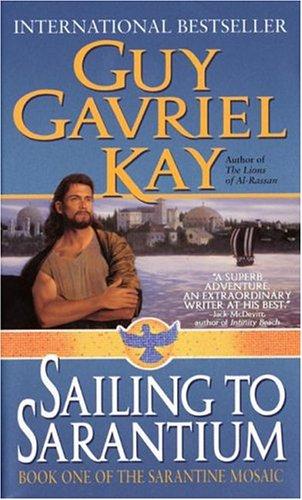enne📚 reviewed Sailing to Sarantium (Sarantine Mosaic, Book 1) by Guy Gavriel Kay (Sarantine Mosaic (1))
Sailing to Sarantium
4 stars
I reread this because playing Pentiment made me in the mood to reread a series about (among other things) religious art disputes. If I had to rank GGK novels that I enjoyed, it would be Tigana first and then these two books next.
In GGK style, these books are "historic fantasy", which mostly means they are heavily based on a lot of history, with some injected fantasy elements, and some ahistorical narrative changes to make things more compelling as a story. I enjoy this kind of thing a lot, but I also know it's not everybody's cuppa (or everybody's cupola, in this case :drum:).
This book is part of a duology with Lord of Emperors, and should not be read alone. There is not any huge closure to the end of the first book, and narratively it feels like it is almost all character and plot setup. (This is not to say that it's not interesting! But more that book one ends with players in place and pieces set in motion, so you can't really stop there.)
This book mostly follows Crispin the mosaicist from Varena (aka Ravenna, Italy) summoned to Sarantium (aka Byzantium) to work on the sanctuary (aka the Hagia Sophia) for Valerius II (aka Justinien I), but also introduces a number of other side characters and side plots that come together for book two. It's all a fun read with good characters. You don't need to know anything about history (I sure don't in any general sense) to enjoy it.
Things I particularly enjoyed: * large cast of important women characters (Gisel, Alixana, Styliane mostly, but also Kasia and Shirin too; the book even has a nod to this in book two, but these characters are all driving the plot more than anybody else) * court politics and clever people (why do I love this sort of thing so much when I would want nothing to do with it personally) * world includes some magic/fantastical elements (I think they are light enough that they don't overpower the rest of the story; this is not Byzantium With Fireball Magic) * telepathic snarky but beloved friends (see also fantastical elements)
Things I could have done without / content warning: * Lysippus the tax collector (aka John the Cappadocian, probably) is really a Baron Harkonnen-esque "evil fat man" trope. The second book includes a brief on-page drugging prior to implied off-page murder?/rape? that I especially could have done without.

